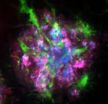(Press-News.org) SAN FRANCISCO, CA—September 28, 2014—Researchers at the Gladstone Institutes have shown that low levels of the protein progranulin in the brain can increase the formation of amyloid-beta plaques (a hallmark of Alzheimer's disease), cause neuroinflammation, and worsen memory deficits in a mouse model of this condition. Conversely, by using a gene therapy approach to elevate progranulin levels, scientists were able to prevent these abnormalities and block cell death in this model.
Progranulin deficiency is known to cause another neurodegenerative disorder, frontotemporal dementia (FTD), but its role in Alzheimer's disease was previously unclear. Although the two conditions are similar, FTD is associated with greater injury to cells in the frontal cortex, causing behavioral and personality changes, whereas Alzheimer's disease predominantly affects memory centers in the hippocampus and temporal cortex.
Earlier research showed that progranulin levels were elevated near plaques in the brains of patients with Alzheimer's disease, but it was unknown whether this effect counteracted or exacerbated neurodegeneration. The new evidence, published today in Nature Medicine, shows that a reduction of the protein can severely aggravate symptoms, while increases in progranulin may be the brain's attempt at fighting the inflammation associated with the disease.
According to first author S. Sakura Minami, PhD, a postdoctoral fellow at the Gladstone Institutes, "This is the first study providing evidence for a protective role of progranulin in Alzheimer's disease. Prior research had shown a link between Alzheimer's and progranulin, but the nature of the association was unclear. Our study demonstrates that progranulin deficiency may promote Alzheimer's disease, with decreased levels rendering the brain vulnerable to amyloid-beta toxicity."
In the study, the researchers manipulated several different mouse models of Alzheimer's disease, genetically raising or lowering their progranulin levels. Reducing progranulin markedly increased amyloid-beta plaque deposits in the brain as well as memory impairments. Progranulin deficiency also triggered an over-active immune response in the brain, which can contribute to neurological disorders. In contrast, increasing progranulin levels via gene therapy effectively lowered amyloid beta levels, protecting against cell toxicity and reversing the cognitive deficits typically seen in these Alzheimer's models.
These effects appear to be linked to progranulin's involvement in phagocytosis, a type of cellular house-keeping whereby cells "eat" other dead cells, debris, and large molecules. Low levels of progranulin can impair this process, leading to increased amyloid beta deposition. Conversely, increasing progranulin levels enhanced phagocytosis, decreasing the plaque load and preventing neuron death.
"The profound protective effects of progranulin against both amyloid-beta deposits and cell toxicity have important therapeutic implications," said senior author Li Gan, PhD, an associate investigator at Gladstone and associate professor of neurology at the University of California, San Francisco. "The next step will be to develop progranulin-enhancing approaches that can be used as potential novel treatments, not only for frontotemporal dementia, but also for Alzheimer's disease."
INFORMATION:
Other authors on the study include Sang-Won Min, Grietje Krabbe, Chao Wang, Yungui Zhou, Rustam Asgarov, Yaqiao Li, Lauren Martens, Lisa Elia, Michael Ward, Lennart Mucke, and Robert Farese. Funding for the research was provided by the Consortium for Frontotemporal Dementia, National Institutes of Health, and the S. D. Bechtel, Jr. Foundation.
About the Gladstone Institutes
To ensure our work does the greatest good, the Gladstone Institutes focus on conditions with profound medical, economic, and social impact – unsolved diseases of the brain, the heart, and the immune system. Affiliated with the University of California, San Francisco, Gladstone is an independent, nonprofit life science research organization that uses visionary science and technology to overcome disease.
Protein that causes frontotemporal dementia also implicated in Alzheimer's disease
Low levels of the naturally occurring protein progranulin exacerbate cellular and cognitive dysfunction, while raising levels can prevent abnormalities in an Alzheimer's model
2014-09-29
ELSE PRESS RELEASES FROM THIS DATE:
Predicting landslides with light
2014-09-29
WASHINGTON, Sept. 29, 2014—Optical fiber sensors are used around the world to monitor the condition of difficult-to-access segments of infrastructure—such as the underbellies of bridges, the exterior walls of tunnels, the feet of dams, long pipelines and railways in remote rural areas.
Now, a team of researchers in Italy are expanding the reach of optical fiber sensors "to the hills" by embedding them in shallow trenches within slopes to detect and monitor both large landslides and slow slope movements. The team will present their research at The Optical Society's (OSA) ...
Scientists identify the signature of aging in the brain
2014-09-29
How the brain ages is still largely an open question – in part because this organ is mostly insulated from direct contact with other systems in the body, including the blood and immune systems. In research that was recently published in Science, Weizmann Institute researchers Prof. Michal Schwartz of the Neurobiology Department and Dr. Ido Amit of Immunology Department found evidence of a unique "signature" that may be the "missing link" between cognitive decline and aging. The scientists believe that this discovery may lead, in the future, to treatments that can slow or ...
Nivolumab shows signs of superior response rate compared to standard chemo in advanced melanoma
2014-09-29
The monoclonal antibody nivolumab achieves superior response rates and a longer duration of response than standard chemotherapy[1] in patients whose melanoma has progressed after treatment with ipilimumab, according to phase III data presented at the ESMO 2014 Congress in Madrid, Spain.
"Previously-treated advanced melanoma patients have limited options," says the study's principal investigator, Professor Jeffrey Weber, Director of the Donald A. Adam Comprehensive Melanoma Research Center of Excellence at the Moffitt Cancer Centre, Tampa, Florida.
Nivolumab is an antibody ...
New data on combination treatments for melanoma
2014-09-29
Combination therapy with both BRAF inhibitor vemurafenib and MEK inhibitor cobimetinib achieves greater progression-free survival and response rates than vemurafenib plus placebo in BRAF-mutation positive melanoma, according to phase III data presented at the ESMO 2014 Congress in Madrid, Spain.
"Before the results of this study, we knew that cobimetinib plus vemurafenib could be safely delivered together with highly promising rates of tumour shrinkage; however until the performance of a scientifically rigorous randomised trial the potential magnitude of this benefit ...
Studies report new findings on treatment options for mesothelioma
2014-09-29
Treating patients with high-dose radiotherapy after chemotherapy and surgery for malignant pleural mesothelioma does not achieve improvements in local relapse and overall survival, according to data from a prospective randomized phase II trial presented at ESMO 2014 Congress in Madrid.
"Mesothelioma remains a difficult disease to find better treatment options for, so we asked whether high-dose hemithoracic radiotherapy would decrease the rate or delay the time of local recurrence after chemotherapy and radical surgery," says lead author Prof Rolf A. Stahel, from the ...
Promising results shown with targeted approaches in subsets of non-small cell lung cancer
2014-09-29
The BRAF inhibitor dabrafenib has significant anti-tumour activity in patients with advanced BRAF V600E mutant non-small cell lung cancer whose disease has progressed after chemotherapy, according to phase II data presented at the ESMO 2014 Congress in Madrid, Spain.
"Reports of lung cancers bearing mutations in BRAF have generated considerable interest because these mutations may be associated with increased sensitivity to BRAF tyrosine-kinase inhibiting agents," says lead author Dr David Planchard, pulmonary oncologist at the Gustav-Roussy Cancer Campus, Paris, France. ...
Scientists make droplets move on their own
2014-09-29
Droplets are simple spheres of fluid, not normally considered capable of doing anything on their own. But now researchers have made droplets of alcohol move through water. In the future, such moving droplets may deliver medicines, etc.
To be able to move on your own – to be self-moving – is a feature normally seen in living organisms. But also non-living entities can be self-moving, report researchers from University of Southern Denmark and Institute of Chemical Technology in Prague, Czech Republic.
The researchers have made alcohol droplets move in a life-like way, ...
Avoid skunky beer this Oktoberfest with the help of chemistry
2014-09-29
WASHINGTON, Sept. 29, 2014 — Oktoberfest is here, and that means beer. And there's nothing worse than reaching for a cold one, taking that first sip and realizing your beer's been skunked: chemicals have reacted to form compounds that cause an awful, bitter taste. This week, Reactions explains why beers get skunky, and what you can do to keep your brews from going bad. Learn all about it at http://youtu.be/9i4dHdQzTFg.
INFORMATION:
Subscribe to the series at Reactions YouTube, and follow us on Twitter @ACSreactions to be the first to see our latest videos.
The American ...
Ancient human genome from southern Africa throws light on our origins
2014-09-29
What can DNA from the skeleton of a man who lived 2,330 years ago in the southernmost tip of Africa tell us about ourselves as humans? A great deal when his DNA profile is one of the 'earliest diverged' – oldest in genetic terms – found to-date in a region where modern humans are believed to have originated roughly 200,000 years ago.
The man's maternal DNA, or 'mitochondrial DNA', was sequenced to provide clues to early modern human prehistory and evolution. Mitochondrial DNA provided the first evidence that we all come from Africa, and helps us map a figurative genetic ...
DNA signature found in ice storm babies
2014-09-29
This news release is available in French. Montreal, September 29th, 2014 - The number of days an expectant mother was deprived of electricity during Quebec's Ice Storm (1998) predicts the epigenetic profile of her child, a new study finds.
Scientists from the Douglas Mental Health University Institute and McGill University have detected a distinctive 'signature' in the DNA of children born in the aftermath of the massive Quebec ice storm. Five months after the event, researchers recruited women who had been pregnant during the disaster and assessed their degrees of ...
LAST 30 PRESS RELEASES:
Emerging class of antibiotics to tackle global tuberculosis crisis
Researchers create distortion-resistant energy materials to improve lithium-ion batteries
Scientists create the most detailed molecular map to date of the developing Down syndrome brain
Nutrient uptake gets to the root of roots
Aspirin not a quick fix for preventing bowel cancer
HPV vaccination provides “sustained protection” against cervical cancer
Many post-authorization studies fail to comply with public disclosure rules
GLP-1 drugs combined with healthy lifestyle habits linked with reduced cardiovascular risk among diabetes patients
Solved: New analysis of Apollo Moon samples finally settles debate about lunar magnetic field
University of Birmingham to host national computing center
Play nicely: Children who are not friends connect better through play when given a goal
Surviving the extreme temperatures of the climate crisis calls for a revolution in home and building design
The wild can be ‘death trap’ for rescued animals
New research: Nighttime road traffic noise stresses the heart and blood vessels
Meningococcal B vaccination does not reduce gonorrhoea, trial results show
AAO-HNSF awarded grant to advance age-friendly care in otolaryngology through national initiative
Eight years running: Newsweek names Mayo Clinic ‘World’s Best Hospital’
Coffee waste turned into clean air solution: researchers develop sustainable catalyst to remove toxic hydrogen sulfide
Scientists uncover how engineered biochar and microbes work together to boost plant-based cleanup of cadmium-polluted soils
Engineered biochar could unlock more effective and scalable solutions for soil and water pollution
Differing immune responses in infants may explain increased severity of RSV over SARS-CoV-2
The invisible hand of climate change: How extreme heat dictates who is born
Surprising culprit leads to chronic rejection of transplanted lungs, hearts
Study explains how ketogenic diets prevent seizures
New approach to qualifying nuclear reactor components rolling out this year
U.S. medical care is improving, but cost and health differ depending on disease
AI challenges lithography and provides solutions
Can AI make society less selfish?
UC Irvine researchers expose critical security vulnerability in autonomous drones
Changes in smoking status and their associations with risk of Parkinson’s, death
[Press-News.org] Protein that causes frontotemporal dementia also implicated in Alzheimer's diseaseLow levels of the naturally occurring protein progranulin exacerbate cellular and cognitive dysfunction, while raising levels can prevent abnormalities in an Alzheimer's model



